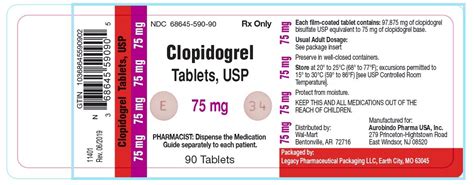Intro
Discover Clopidogrel 75mg Tablets Uses, a blood thinner preventing heart attacks, strokes, and blood clots, with antiplatelet properties, managing cardiovascular diseases, and reducing myocardial infarction risks.
Clopidogrel 75mg tablets have become a cornerstone in the management of cardiovascular diseases, particularly in the prevention of blood clots that can lead to heart attacks and strokes. The importance of this medication cannot be overstated, given the prevalence and severity of cardiovascular conditions worldwide. As a key player in the field of antiplatelet therapy, clopidogrel works by inhibiting the activation of platelets, which are small blood cells that play a crucial role in the formation of blood clots. By reducing the likelihood of clot formation, clopidogrel significantly decreases the risk of major cardiovascular events, thereby improving the quality of life for millions of people around the globe.
The mechanism of action of clopidogrel involves the irreversible inhibition of the P2Y12 receptor on platelets, which is essential for the activation of platelets by adenosine diphosphate (ADP). This process not only prevents the formation of harmful blood clots but also reduces inflammation within the blood vessels, further contributing to its protective effects against cardiovascular disease. Given its effectiveness and relatively favorable safety profile, clopidogrel has become a widely prescribed medication for patients at risk of heart attack or stroke, including those with a history of myocardial infarction, stroke, or peripheral artery disease.
The use of clopidogrel 75mg tablets is particularly beneficial for patients who are at high risk of experiencing a major adverse cardiac event. This includes individuals with acute coronary syndrome, those undergoing percutaneous coronary intervention (PCI) with stent placement, and patients with peripheral artery disease. The dosing regimen typically involves an initial loading dose followed by a maintenance dose of 75mg once daily. This regimen has been shown to be effective in reducing the incidence of ischemic events without significantly increasing the risk of major bleeding, which is a common concern with antithrombotic therapies.
How Clopidogrel Works

Clopidogrel's working mechanism is complex and involves several steps that ultimately lead to the inhibition of platelet activation. After administration, clopidogrel is metabolized into its active form, which then binds to the P2Y12 receptor on the surface of platelets. This binding is irreversible, meaning that the platelet remains inhibited for its entire lifespan, which is typically about 7 to 10 days. The inhibition of the P2Y12 receptor prevents the activation of platelets by ADP, thereby reducing the aggregation of platelets and the formation of blood clots.
Benefits of Clopidogrel
The benefits of clopidogrel are multifaceted and have been extensively studied in various clinical trials. Some of the key advantages of using clopidogrel include: - Reduced risk of heart attack and stroke in patients with a history of these conditions or with risk factors for them. - Effective in preventing blood clots in patients undergoing PCI with stent placement. - Can be used in combination with other medications, such as aspirin, for enhanced protection against cardiovascular events. - Generally well-tolerated, with common side effects being mild and temporary.Clopidogrel Uses and Indications

Clopidogrel 75mg tablets are indicated for the prevention of atherothrombotic events in patients with acute coronary syndrome (ACS), recent myocardial infarction (MI), recent stroke, or established peripheral artery disease. The specific uses and indications for clopidogrel can be broken down into several categories:
- Acute Coronary Syndrome (ACS): Clopidogrel is used in patients with ACS, including those with unstable angina or non-ST-elevation myocardial infarction (NSTEMI), to reduce the rate of myocardial infarction and stroke.
- Recent Myocardial Infarction (MI): Patients who have had a recent MI benefit from clopidogrel to reduce the risk of recurrent MI and other cardiovascular events.
- Recent Stroke: For patients who have experienced a recent stroke, clopidogrel can help prevent another stroke, especially in those with a history of cryptogenic stroke or stroke of arterial origin.
- Peripheral Artery Disease (PAD): Clopidogrel is indicated for patients with established PAD to reduce the risk of myocardial infarction, stroke, and other cardiovascular events.
Administration and Dosage
The administration and dosage of clopidogrel are straightforward. The typical dosing regimen involves an initial loading dose of 300mg, followed by a maintenance dose of 75mg once daily. This regimen can be adjusted based on the patient's condition and response to the medication. It is essential to follow the prescribed dosing regimen exactly as directed by the healthcare provider to ensure the effectiveness of the medication and minimize the risk of side effects.Side Effects and Safety Considerations

While clopidogrel is generally well-tolerated, like all medications, it can cause side effects. The most common side effects are mild and may include:
- Diarrhea
- Abdominal pain
- Headache
- Dizziness
- Rash
- Itching
More severe but less common side effects can include bleeding, such as gastrointestinal bleeding or cerebral hemorrhage, which requires immediate medical attention. It is crucial for patients to be aware of the signs of bleeding and to seek help promptly if they experience any unusual bleeding or bruising.
Interactions with Other Medications
Clopidogrel can interact with other medications, which may affect its efficacy or increase the risk of side effects. Some of the medications that can interact with clopidogrel include: - Aspirin: While often used in combination with clopidogrel, the use of both medications can increase the risk of bleeding. - Warfarin: Concomitant use with warfarin can increase the risk of bleeding. - Nonsteroidal anti-inflammatory drugs (NSAIDs): These can also increase the risk of gastrointestinal bleeding when used with clopidogrel. - Certain antidepressants: Selective serotonin reuptake inhibitors (SSRIs) can increase the risk of bleeding when used with clopidogrel.Precautions and Warnings

Before starting clopidogrel, patients should be aware of several precautions and warnings:
- Bleeding Risk: The most significant risk associated with clopidogrel is bleeding. Patients should be monitored for signs of bleeding and should report any unusual bleeding or bruising to their healthcare provider immediately.
- Surgery: Patients scheduled for surgery should inform their surgeon that they are taking clopidogrel, as it may need to be discontinued before surgery to reduce the risk of bleeding.
- Pregnancy and Breastfeeding: There is limited information on the use of clopidogrel in pregnant and breastfeeding women. It should be used with caution and only when the benefits outweigh the risks.
Conclusion and Future Directions
In conclusion, clopidogrel 75mg tablets have revolutionized the management of cardiovascular diseases by providing an effective and relatively safe means of preventing blood clots. As research continues to uncover the complexities of platelet activation and thrombosis, it is likely that new and even more effective antiplatelet therapies will emerge. However, for now, clopidogrel remains a cornerstone in the prevention of atherothrombotic events, offering hope and improved outcomes for millions of patients worldwide.Final Thoughts

As we look to the future, it is essential to continue educating patients and healthcare providers about the benefits and risks of clopidogrel, ensuring that it is used appropriately and safely. By doing so, we can maximize its potential to prevent cardiovascular events and improve the quality of life for those at risk.
We invite our readers to share their thoughts and experiences with clopidogrel in the comments section below. Your input can help others understand the medication better and make informed decisions about their health. Additionally, if you found this article informative, please consider sharing it with others who might benefit from this information.
What is clopidogrel used for?
+Clopidogrel is used to prevent blood clots that can cause heart attacks and strokes in patients with cardiovascular disease.
How does clopidogrel work?
+Clopidogrel works by inhibiting the activation of platelets, which are small blood cells that play a crucial role in the formation of blood clots.
What are the common side effects of clopidogrel?
+Common side effects of clopidogrel include diarrhea, abdominal pain, headache, dizziness, rash, and itching. More severe side effects can include bleeding.
